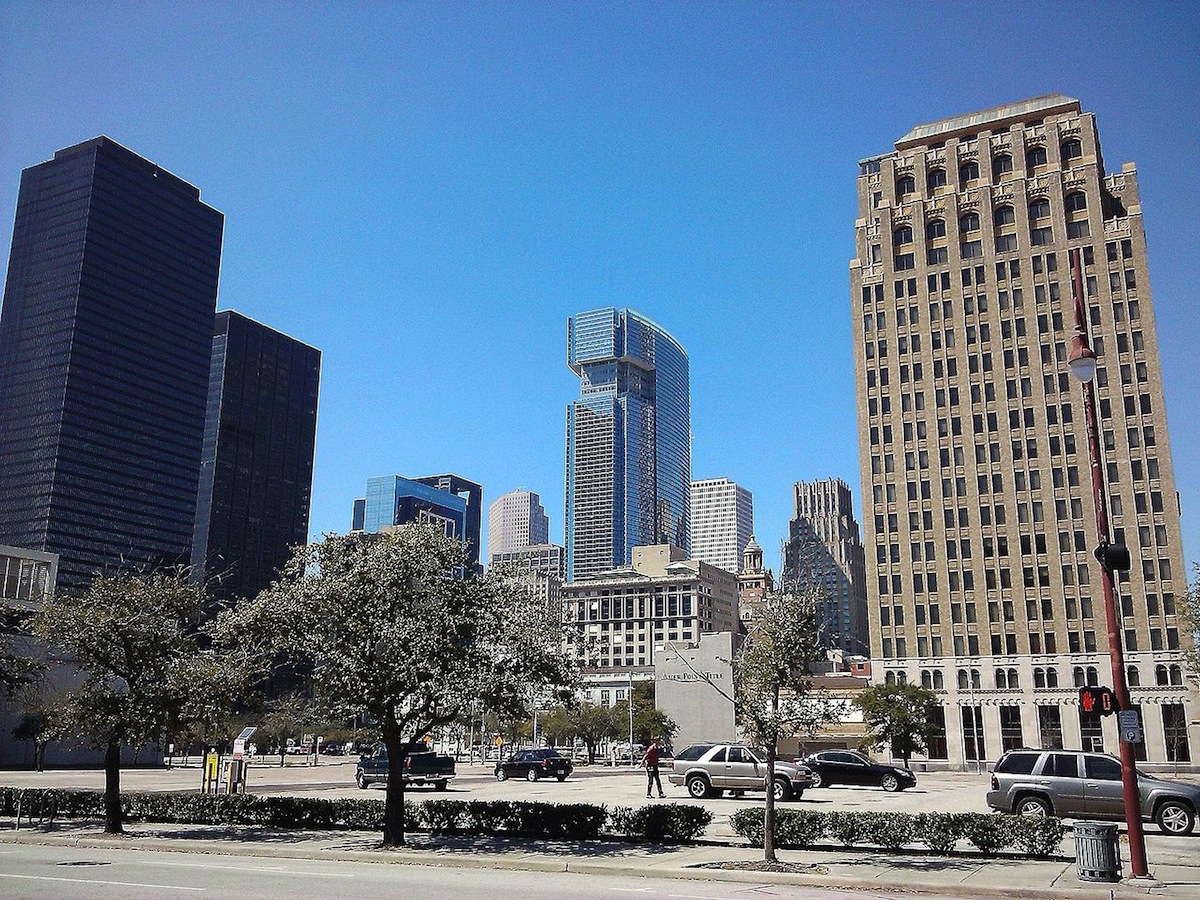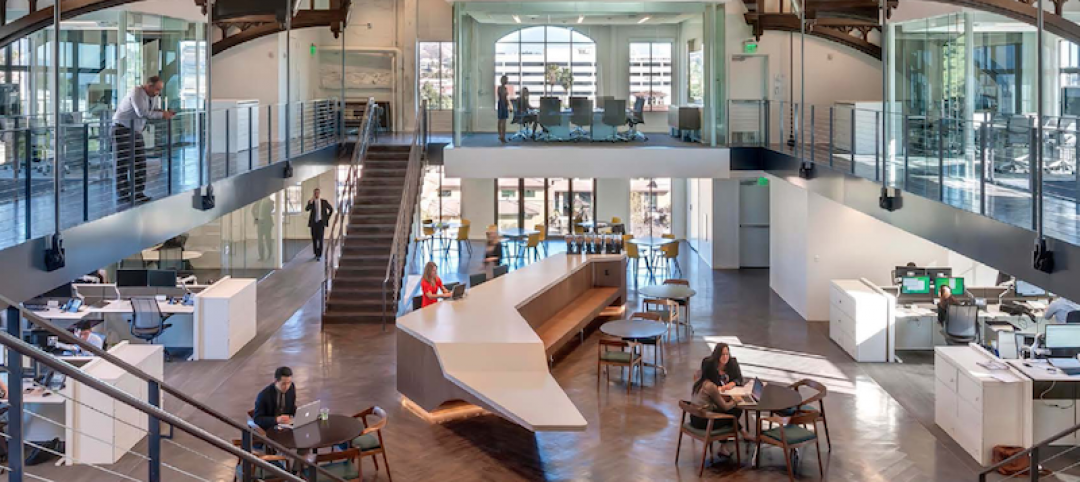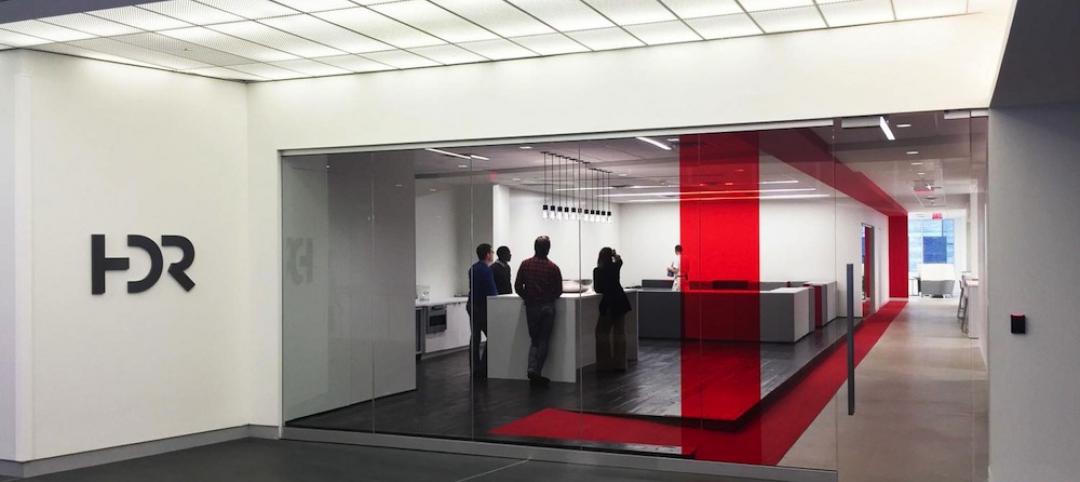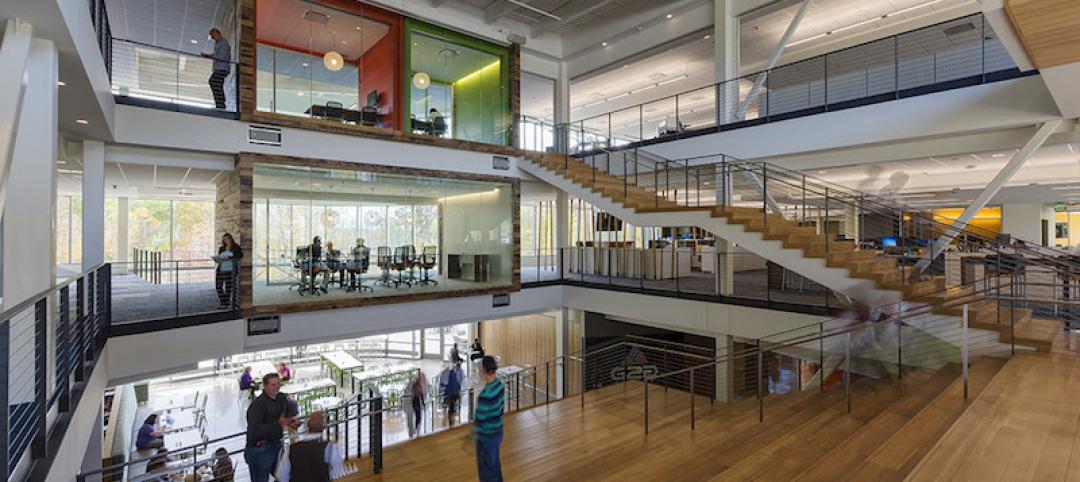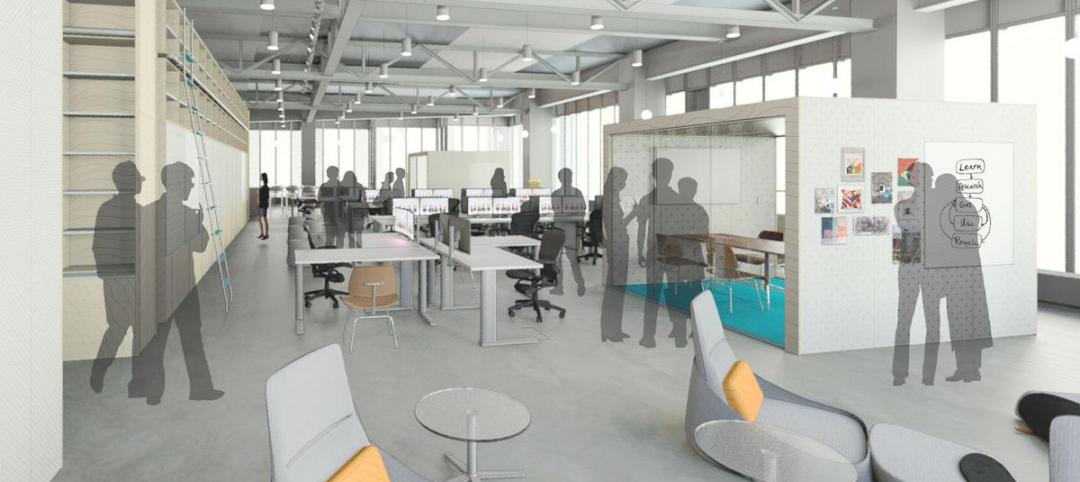A few days ago, The Wall Street Journal reported that one-sixth of all office space under construction nationwide is located in the Houston metropolitan area.
The Journal quoted the property data firm CoStar Group, which stated that by the end of 2014, 80 buildings with about 18 million sf of office space were started in Greater Houston.
This wouldn’t be earthshaking news—Houston, after all, continues to be one of country’s more vibrant markets, ranking 39th out of 300 of the largest metropolitan economies worldwide, according to the Brookings Institution’s Global MetroMonitor—were it not for the fact that all this office construction is occurring at a time when the price of oil—a commodity that helps lubricate Houston’s economic engine—has plummeted by more than 50% since last summer.
Several of the biggest energy companies have announced more than 30,000 layoffs worldwide, and a sizable number of those workers could be Houstonians. Fewer workers require fewer offices, and employers are already rushing to sublease the space they occupy, the Journal reports.
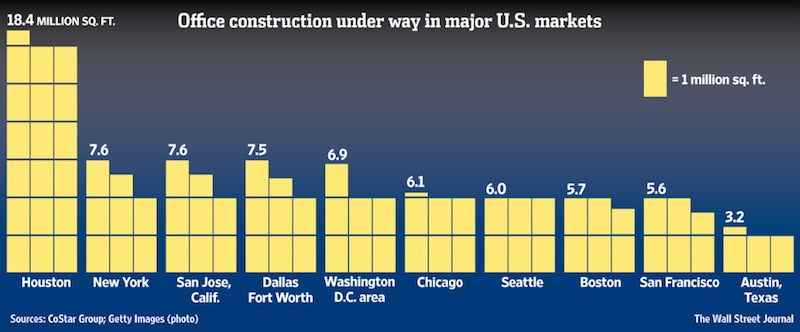 Sources: WSJ, CoStar Group
Sources: WSJ, CoStar Group
In a follow-up story, the Journal reports that 13.2 million sf of office space are on schedule to be completed in 2015, the highest total since 1984.
CoStar now estimates that Houston’s vacancy rate could rise to 15.3% by 2016, from 10.8% at the end of 2014.
The newspaper singles out one development firm, Hines, that’s building a 48-story tower on spec, without tenants lined up, as an example of how certain companies suddenly find themselves exposed to a potential economic downturn. On the flip side, excess office space and higher vacancy rates could lead to lower rents, and opportunities to find existing space rather than building new.
HOUSTON NOT AS OIL DEPENDENT
But is Houston really headed for a fall? Not if you listen to some of the comments posted about the Journal article. One reader insisted that Houston is nowhere near as oil dependent as it was in the 1980s, when its housing market all but collapsed and nine of Texas’s 10 largest banks failed.
“Houston is twice as large as it was in 1980, and its dynamic economy is now twice as diversified,” one reader commented. “Also, the oil industry has fortified itself since 1980. Houston now boasts 11 major economic sectors in its massive economy.”
(Similar arguments about Louisiana’s supposedly more-diverse economy were made recently in an article published by The Advocate in Baton Rouge, La., which reported that only 13% of that state’s proceeds is now tied to mineral revenue, compared to 42% in the 1980s.)
A recent survey of Houston-area purchasing managers at 45 companies found that those not so tightly bound to oil prices—such as utilities and non-energy manufacturing—have seen a boost in new orders, production levels, and supplier purchases.
“We’ll have to see where things go in the next few months,” Ross Harvison, Chairman of the Institute for Supply Management-Houston Business Survey Committee, told the Houston Chronicle.
Even the Journal article acknowledges that any “bust” in Houston’s economy might turn out to be short term. The newspaper quotes Mike Mair, Executive VP in charge of Skanska’s construction in Houston, who says his company isn’t panicking about what he concedes could be as “soft” 2015. Skanska is currently building two 12-story towers, one of which doesn’t have tenants yet, and Mair says those projects will proceed. “I’m not afraid of ’16 and ’17,” he is quoted as saying.
Mair’s optimism is promulgated, in part, on long-range projections about Houston’s population, now at around 6.5 million. The Texas State Data Centers expects that people count to expand by an average 2.2 million residents per decade over the next 40 years.
Even with falling oil prices, Houston is expected to add 62,900 jobs in 2015, according to the Greater Houston Partnership. Most cities would welcome such a bounty, but the bar is set higher for Houston, which added 120,000 jobs last year.
Related Stories
Building Tech | Apr 13, 2016
The Hyperchair gives employees access to their own personal set of climate controls
Not only can the Hyperchair reduce heating and cooling costs and maximize employee comfort, but it can help a company become more environmentally friendly, as well.
Architects | Mar 20, 2016
Ars Gratia Artis: A North Carolina architect emphasizes the value of art in its designs
Turan Duda says clients are receptive, but the art must still be integral to the building’s overall vision.
Office Buildings | Mar 16, 2016
Google releases new plans and renderings of its Mountain View campus
The original canopy design scheme is still in place, but the plans now call for it to be opaque.
Office Buildings | Mar 10, 2016
Expedia unveils design for Seattle waterfront campus
Transparency and outdoor areas will give the complex a Pacific Northwest vibe.
Office Buildings | Mar 9, 2016
CBRE: Workplace wellness on the rise
As insurance premiums and deductibles continue to rise, both employees and employers are evaluating options to improve their wellbeing, writes CBRE Healthcare Managing Director Craig Beam.
Market Data | Mar 6, 2016
Real estate execs measure success by how well they manage ‘talent,’ costs, and growth
A new CBRE survey finds more companies leaning toward “smarter” workspaces.
Office Buildings | Mar 2, 2016
HDR redesigns Twin Cities' studio to have coffee shop vibe
With open spaces, huddle rooms, and a design lab, the firm's new digs are drastically different than the old studio, which felt like working in a law office. Design Principal Mike Rodriguez highlights HDR's renovation plan.
Office Buildings | Mar 1, 2016
SmithGroupJJR and The Christman Company create a financial headquarters without the drab
The “un-bank” design ditched the stuffy design elements typical of financial institutions and, instead, created something much more inviting.
Office Buildings | Feb 29, 2016
Mobileapolis: An open experiment in workplace mobility
Check out this fun infographic that explains Perkins+Will's ambitions, findings, and next steps for the future home of the firm's Minneapolis office.
Office Buildings | Feb 26, 2016
Benching, desking, and (mostly) paper-free: Report identifies top trends in workplace design for 2016
The report, from Ted Moudis Associates, encompasses over 2.5 million sf of workspace built over the past two years.


